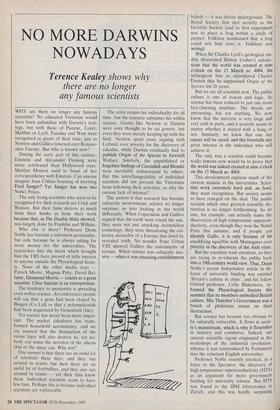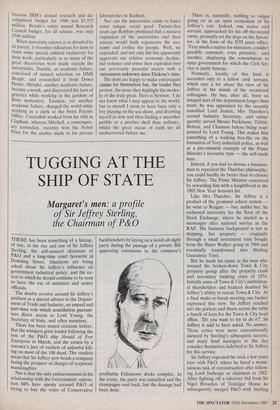NO MORE DARWINS NOWADAYS
Terence Kealey shows why
there are no longer any famous scientists
WHY are there no longer any famous scientists? No educated Victorian would have been unfamiliar with Darwin's writ- ings, nor with those of Pasteur, Lister, Malthus or Lyell. Faraday and Watt were recognised as giants of their time, just as Newton and Galileo towered over Renaiss- ance Europe. But who is known now?
During the early part of this century, Einstein and Alexander Fleming were more celebrated than Hollywood stars. Marilyn Monroe used to boast of her correspondence with Einstein. Can anyone imagine Joan Collins boasting of knowing Fred Sanger? Yet Sanger has won two Nobel Prizes.
The only living scientists who seem to be recognised for their research are Crick and Watson. But their fame derives as much from their books as from their work because that, as The Double Helix showed, was largely done by Franklin and Wilkins.
Who else is there? Professor Denis Noble has become a television personality, but only because he is always asking for more money for the universities. The researches into the heart which brought him the FRS have proved of little interest to anyone outside the Physiological Socie- ty. None of the other media stars Patrick Moore, Magnus Pyke, David Bel- lamy, Desmond Morris — counts as a great scientist. Clive Sinclair is an entrepreneur.
The tendency to anonymity is spreading even within science. At conferences people will say that a gene had been cloned by Biogen (Co Ltd) or that a polynucleotide had been sequenced by Genentech (Inc).
Yet science has never been more impor- tant. The pocket calculator has trans- formed household accountancy, and we are assured that the destruction of the ozone layer will also destroy us, yet no- body can name the inventor of the silicon chip or the spray can. Why not?
One answer is that there are an awful lot of scientists these days, and they run around in teams; but then there are an awful lot of footballers, and they also run around in teams — yet their fans know them. Individual scientists seem to have few fans. Perhaps this is because individual scientists are replaceable.
The artist retains his individuality for all time, but the scientist subsumes his within science. Giants like Newton or Darwin were once thought to be sui generis, but even they were merely keeping up with the field. Newton spent years arguing with Leibnitz over priority for the discovery of calculus, while Darwin eventually had to publish Origin of the Species to forestall Wallace. Similarly, the unpublished or forgotten findings of Cavendish and Mendel were inevitably rediscovered by others. But this interchangeability of individual scientists did not prevent the Victorians from following their activities, so why the current lack of interest?
The answer is that research has become culturally monotonous; science no longer surprises us into looking at the world differently. When Copernicus and Galileo argued that the earth went round the sun, they were not just attacking Aristotelian cosmology, they were threatening the col- lective mentality of a Europe that lived by revealed truth. No wonder Pope Urban VIII showed Galileo the instruments of torture. When science was culturally inci- sive — when it was attacking establishment beliefs — it was driven underground. The Royal Society first met secretly as the Invisible Society (and its first experiment was to place a frog within a circle of pepper. Folklore maintained that a frog could not hop over it. Folklore was wrong).
When Sir Charles Lyell's geological stu- dies threatened Bishop Ussher's calcula- tions that the world was created at nine o'clock on the 15 March Esc 4004, the subsequent fuss so intimidated Charles Darwin that he suppressed Origin of the Species for 20 years.
But we are all scientists now. The public culture is one of reason and logic. So science has been reduced to just one more fact-churning machine. The details are interesting, but not startling. We now know that the universe is very large and very cold in parts, and it scarcely seems to matter whether it started with a bang or not. Similarly, we know that one day cancer will be cured, and this forestalls any great interest in the individual who will achieve it.
The only way a scientist could become really famous now would be to prove that the world was indeed created at nine o'clock on the 15 March BC 4004.
This development explains much of the current malaise in the universities. Scien- tists work extremely hard and, au fond, they want recognition. But society seems to have reneged on the deal. The public acclaim which once greeted scientific dis- tinction is no longer forthcoming. So no one, for example, can actually name the discoverers of high temperature supercon- ductivity, even though they won the Nobel Prize this autumn; and if people can identify Gallo, it is only because of his unedifying squabble with Montagnier over priority in the discovery of the Aids virus.
But the scientists want attention, so they are trying to re-educate the public back into a 19th-century world view. Thus, Denis Noble's recent Independent article in de- fence of university funding was entitled 'Britain's culture in crisis'; and his fellow Oxford professor, Colin Blakemore, in-
formed the Physiological Society this summer that its members embodied British culture. Mrs Thatcher's Government was a bunch of philistines intent on their destruction.
But science has become too obvious to be culturally vulnerable. It flows in socie- ty's mainstream, which is why it flourishes in industry and commerce. Indeed, our current scientific vigour originated in the workshops of the industrial revolution, whence it was reintroduced by Parliament into the reluctant English universities.
Professor Noble recently invoked, in a letter to the Spectator, the discovery of
high temperature superconductivity (HTS) as an argument for more government funding for university science. But HTS was found in the IBM laboratories in Zurich. and this was hardly surprising
because IBM's annual research and de- velopment budget for 1986 was $3,975 million. Britain's entire annual Research Council budget, for all science, was only £540 million.
When university science is so dwarfed by its parent, it becomes ridiculous for dons to claim some special cultural exclusivity for their work; particularly as so many of the great discoveries were made outside the universities. Darwin, an academic failure, conceived of natural selection on HMS Beagle, and researched it from Down House. Mendel, another academic failure, became a monk, and discovered the laws of genetics while working in the gardens of Brno monastery. Einstein, yet another academic failure, changed the world while working as a clerk at the Swiss Patents Office, Cavendish worked from his villa in Clapham, whereas Mitchell, a contempor- ary iconoclast, recently won the Nobel Prize for the studies made in his private laboratories in Bodmin.
Nor can the universities claim to foster some unique social good. Twenty-five years ago Robbins promised that a massive expansion of the universities and their science would both regenerate the eco- nomy and civilise the people. Well, we expanded, and not only did this apparently aggravate our relative economic decline, but violence and crime then exploded onto our previously peaceful streets with a viciousness unknown since Dickens's time.
The dons are happy to make extravagant claims for themselves but, the louder they protest, the more they highlight the modes- ty of the truly great. Here is Newton: 'I do not know what I may appear to the world, but to myself I seem to have been only a boy playing on the sea-shore, and diverting myself in now and then finding a smoother pebble or a prettier shell than ordinary, whilst the great ocean of truth lay all undiscovered before me.'











































































































 Previous page
Previous page